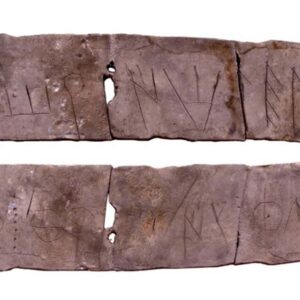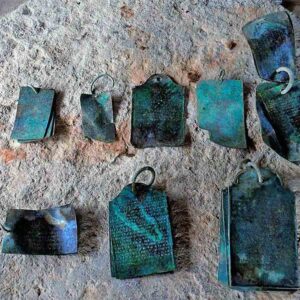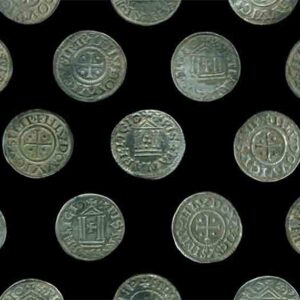Up to date
22 July, 2023 – 18:55
Sahir
Oldest Proof of Southeast Asian Curry Present in Vietnam
- Learn Later
The traditional spice commerce throughout the famed overland after which maritime Silk Route (Street) has been studied in nice element, however the finer intricacies of natural materials have oft been missed for lack of preservation. Now, from the Óc Eo archaeological advanced in southern Vietnam, proof of Southeast Asia’s oldest curry, dated to 2,000 years in the past, has been recognized. That is the oldest proof of curry discovered outdoors India!
Analyzing the Remnants of Spice and Natural Matter
By means of the evaluation of plant stays and 717 grains of starch that have been recovered and extracted from 12 historic stone grinding instruments uncovered on the website, researchers recognized traces of rice, in addition to a wealthy array of spices, together with turmeric, ginger, fingerroot, sand ginger, galangal, clove, nutmeg, and cinnamon. They in contrast and analyzed these spices towards a wide selection of virtually 200 spices.
To their shock, the nutmeg seeds recovered from the location have been nonetheless fragrant two millennia later! Starch grains from turmeric and ginger have been essentially the most considerable out of the 8 spices uncovered from the location. These grains displayed damaged options, and have been possible finely floor, making them akin to the starch granules present in trendy curry powder.
- Three Historic Diets That Are Nonetheless In style Right this moment
- Nutmeg Poisoning: A Lethal Addition to the Kitchen Cupboard?
“We found all kinds of spices that had travelled from completely different areas to Óc Eo,” mentioned Dr Hsiao-chun Hung of the Australian Nationwide College, who led the excavation and analysis. “All of those spices reached Vietnam 2,000 years in the past, contributing to the creation of pleasant dishes that will need to have been loved by the individuals of that point.” This analysis has been printed within the newest version of the journal Sciences Advances, and in addition highlights the earliest identified proof of spice processing from this area.
The cookware from the place the proof is recovered resembles an anvil in dimension and form, and is believed to have been used for grinding spices. The location is located amidst historic canals within the southwestern Mekong Delta. This location was as soon as a outstanding port of the Funan kingdom, which thrived from the primary to seventh century C.E.

A footed grinding slab is excavated in southern Vietnam in 2018. (Khanh Trung Kien Nguyen/Southern Institute for Social Sciences, Vietnam)
“The preservation of plant stays in Óc Eo is outstanding,” says Australian Nationwide College archaeologist and examine co-author. She suspects that the humid local weather of southern Vietnam helped defend the stays from degradation. “Once we uncover the seeds from the muddy soil for the primary time, they seem remarkably contemporary, making it tough to consider that they’re almost 2000 years outdated.”
Southeast Asian Curry, Instruments, and the Indian Connection
Probably the most outstanding amongst the stone instruments, which included mortars and pestles, was the aforementioned anvil-shaped 75-centimeter (29.5 inch) lengthy footed grinding slab made from sandstone. It resembles comparable implements nonetheless employed in the present day for making spice paste. Notably, comparable objects have been present in historic Indian websites, in line with the archaeologists who performed the evaluation of the implements between 2017 and 2019.
There has lengthy been an consciousness of the sturdy Indian impression on Southeast Asian communities. This affect was evident in architectural, linguistic, and spiritual similarities throughout that period. The current examine, nonetheless, has offered “rock strong proof” of this affect extending into the realm of delicacies, experiences Science.
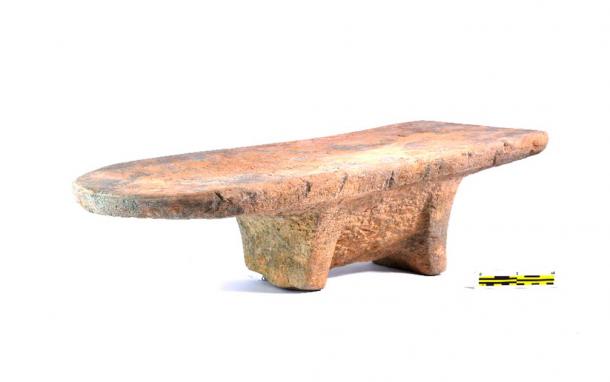
A sandstone grinding slab discovered at Óc Eo in Vietnam, on which traces of spices have been recognized. (Trung Kien Nguyen)
With compelling archaeological proof, the origins of curry may be traced again to India over 4,000 years in the past (despite the fact that there is no such thing as a proof of the phrase ‘curry’ itself getting used – it was likely a colonial misunderstanding). This culinary heritage is supported by the invention of spice residues, together with remnants of eggplant and mango, discovered adhered to human tooth and in historic cooking pots.
“Earlier than this examine, we had solely restricted clues from historic paperwork in India, China and Rome concerning the early spice trades. Nevertheless, this analysis is the primary to substantiate that these spices have been certainly traded commodities that existed inside the world maritime buying and selling networks almost 2,000 years in the past,” added Hsiao-chun Hung.
The location of Óc Eo, having been excavated because the Nineteen Forties, has yielded quite a few artifacts indicating that town was a central hub in an intensive commerce community that stretched so far as the Mediterranean Sea.
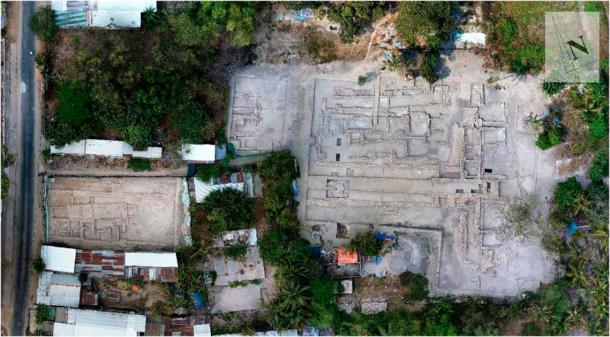
Aerial view of brick foundations at Go Sau Thuan within the Óc Eo advanced. (Khanh Trung Kien Nguyen)
The Lasting Essence of Curry Flavors
The mixture of spices discovered at Óc Eo stays integral to Southeast Asian curries in the present day. Nevertheless, the time period “curry” won’t seize the huge array of the area’s culinary range precisely. This phrase originated from European colonists, who used it broadly to confer with spiced dishes from southern Asia.
In actuality, “curry” can tackle varied types, and understanding the intricacies of various regional cuisines was essential within the evaluation of Khanh Trung Kien Nguyen, an archaeologist on the Southern Institute of Social Sciences in Ho Chi Minh Metropolis, who collaborated on the examine.
The recipes dropped at Vietnam by merchants underwent native modifications with the addition of acquainted elements, resulting in the event of a singular culinary custom. Whereas many spices discovered at Óc Eo have been most likely imported, others are indigenous to Southeast Asia.
- Saffron: Tracing the Origins of a Treasured Historic Spice
- Mediterranean Cultures Imported Asian Unique Meals Earlier than 1700 BC
As an example, sure sorts of ginger, generally utilized in Thai and different Southeast Asian cuisines, are uncommon in comparable Indian dishes. The restoration of coconut traces from the instruments additional means that spices at Óc Eo have been thickened with coconut milk, a way attribute of recent Southeast Asian curries.
A number of spices discovered at Óc Eo, like clove and nutmeg, are native to South Asia and jap Indonesia. Their presence in an historic Vietnamese metropolis signifies that vacationers from these areas possible launched their conventional recipes to mainland Southeast Asia throughout the early centuries C.E.
A few of these journeys coated 1000’s of kilometers, highlighting Southeast Asia’s centrality and function within the lacking chains of human growth. Within the annals of human historical past, it clearly served as a crossroads for migrants, retailers, and vacationers from completely different locations.
“The curry recipe used in the present day has not deviated considerably from the traditional Óc Eo interval,” concludes Nguyen, who notes that using turmeric, clove, and cinnamon has remained constant over the centuries. “This continuity highlights the lasting essence of curry flavors in Vietnamese delicacies.”
Prime picture: The oldest proof of Southeast Asian curry has been present in southern Vietnam. Supply: Adobe Stock / Jasmina
By Sahir Pandey
References
Jacobs, P. 2023. Curry might have landed in Southeast Asia 2000 years in the past. Obtainable at: https://www.science.org/content/article/curry-may-have-landed-southeast-asia-2000-years-ago.
Lu, D. 2023. 2,000-year-old curry: scientists uncover proof of historic recipe in south-east Asia. Obtainable at: https://www.theguardian.com/world/2023/jul/22/2000-year-old-curry-scientists-discover-evidence-of-ancient-recipe-in-south-east-asia.
Wang, W., et al. 2023. Earliest curry in Southeast Asia and the worldwide spice commerce 2000 years in the past. Sciences Advances, 9(29). Obtainable at: DOI: 10.1126/sciadv.adh5517.
Wang, W., Hung, H. 2023. Researchers discover proof of a 2,000-year-old curry, the oldest ever present in Southeast Asia. Obtainable at: https://theconversation.com/researchers-find-evidence-of-a-2-000-year-old-curry-the-oldest-ever-found-in-southeast-asia-210192.


